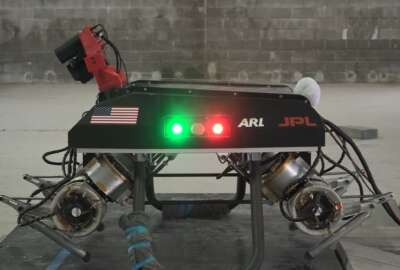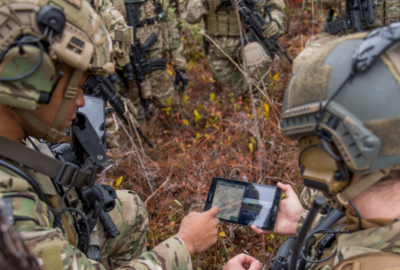
Teaching cyber and electronic warfare from afar
To improve the training and education of its cyber, signal and electronic warfare operators, the Army has enlisted the University of South Carolina. The univers...
Best listening experience is on Chrome, Firefox or Safari. Subscribe to Federal Drive’s daily audio interviews on Apple Podcasts or PodcastOne.
To improve the training and education of its cyber, signal and electronic warfare operators, the Army has enlisted the University of South Carolina. The university will develop a variety of degree-granting distance learning classes. For details, Federal Drive with Tom Temin turned to the executive director of the Office of Innovation Partnerships and Economic Engagement, Bill Kirkland.
Interview transcript:
Tom Temin: Mr. Kirkland, good to have you on.
Bill Kirkland: Appreciate the invitation.
Tom Temin: Tell us about this agreement. Is anything underway yet or you have a memorandum of understanding? What’s the status of the program for starters?
Bill Kirkland: Well, we currently have a memo of understanding. It actually has started with our governor here in South Carolina, government master, and the Army Cyber Center of Excellence in Gusta, where they formed our Commission on Higher Education, actually signed the MOU for all the higher-ed institutions in South Carolina. And then we at the university being the flagship, we have eight campuses, 53,000 students across the state, approximately 53,000. We then engaged with the Cyber Command and signed our own memo of understanding, looking at educational programs, everything from distance learning to in classroom, and looking at traditional educational programs, we can service the community down in Fort Gordon.
Tom Temin: So the implication here is that University of South Carolina has some chops in these areas, cybersecurity signal electronic warfare.
Bill Kirkland: Yes sir. More so towards cybersecurity, we actually have a bachelors program in cyber, cyber operations. We also have a series of other cyber certificate type programs here at the university. And of course, we have the undergraduate programs that gives you the foundation for a cyber degree. The other thing we work in with the NSA and others is we have a cyber portal, which is really looking at partnerships with industry. Examples like Palo Alto Works and Cisco where you can actually take online courses, and is credentialing, it’s stackable credentials where at some point, a soldier and or private sector folks could come out with a credential in cyber as it relates to infrastructure and other areas.
Tom Temin: Got it. So will you develop specific curriculum for the Army or will they just simply have available to them the same courses that already exist?
Bill Kirkland: Well, the combination we hope. We’re we’re still in the very early stages of discussions. Right now it’s USC campus in Columbia, and the University of South Carolina’s campus in Aiken, which by the way is only about 20 miles from Fort Gordon across the river in South Carolina. So it’s a combination of both. And we’re really excited as you know that Fort Gordon is now the Cyber Center of Excellence for the entire Army, the cyber commands there. So it is a major opportunity for our universe, but also it includes the private sector so it really becomes a area of focus for the governor and others within state government.
Tom Temin: And do you envision the soldiers coming to the University of South Carolina facilities or will you send people over to Fort Gordon, or a little bit of both? How will that all work?
Bill Kirkland: It’ll be a little bit of both in that, again, our campus in Aiken is 20-25 minutes from Fort Gordon. And also, they’ll be housing doing classes inside and outside of the gates of Fort Gordon. But it would be a combination of both. We hope to engage our faculty to really engage with the command and with the soldiers and start a really good partnership. The other is there’ll be internship opportunities for our students, all these other things, and it’ll be we hope free flowing between the Cyber Command and our students and our faculty.
Tom Temin: And what’s your sense of the demand from the Army? Will they be sending scores, dozens, hundreds of people over? Give us a sense of the scope.
Bill Kirkland: Tom, we’re still obviously in the early stages, but we would hope it’d be a free flow of a lot of soldiers. But also, if you look at site, the Cyber Command, there’s also the private sector support of the Cyber Command at Fort Gordon. So our plan is also to to work with the credentialing of private sector folks that will be serviced in the Cyber Command, that would be consultants, that would be deep computer scientists, data scientists and others. So it really is a public-private partnership, support the command, support the soldiers, but also support the private sector that will be servicing the new command at Fort Gordon.
Tom Temin: Sounds like it will be the opportunity for the soldiers to get full degree programs, as well as certifications in the various vendors such as Cisco.
Bill Kirkland: Yeah. So there’s going to be both. There’ll be an opportunity for the soldier, we’ve set it up for tuition assistance or in state tuition for soldiers in Georgia that are around Fort Gordon willl come over to South Carolina. So it’ll be online programs, it will be in person programs. And then again, as you mentioned, this new cyber portal, that we’ll be working on stackable credentials for the soldiers, but also the private sector. So it’s really free flowing, it’s an exciting partnership for the university. Of course, we’re the flagship, and we’re the first university in South Carolina to secure and finalize an MOU with the command. So we hope in the next three to six months, we’ll be up and running and we’ll get to see some good things happening.
Tom Temin: And those people from the private sector that are contributing here, Cisco and you mentioned Palo Alto, will they have people on hand because that means they’d have to come to South Carolina and the sushi is not as good?
Bill Kirkland: Well, no we have pretty good sushi. But I would say to you that no this would be more – we’ve been trained and we have the agreements to do stackable credentials and teach different parts of their curriculum and different parts of the technology for both those, and there’s others. We work with IBM Skills Academy. So we have a number of partners that could actually contribute to this partnership. But most of that would be done online through an online portal, which I could provide you that information at any point and the link to the portal.
Tom Temin: With respect to ROTC, is there any tie in possible there?
Bill Kirkland: Yes sir. We’ve actually already had, as it relates to our portal, our cyber portal, we’ve had a number of our ROTC students that have already started working on stackable credentials. And yes, there’ll be a tie right back into Fort Gordon with ROTC program.
Tom Temin: And the other end of this is I know the Veterans Affairs Department has been working with a lot of institutions for people that have just mustered out of the military and supporting them as they pursue cyber and computer science related goals. Do you have that part of it coveredn also?
Bill Kirkland: Yes sir we do. We’ve actually just hired a two star general, General Todd McCaffrey retired to run our new military affairs office here at the University of South Carolina. And Todd is putting together a number of programs for retention, when the soldiers leave, retire or leave active duty. And as you’re aware, we’re very military heavy state here in South Carolina. We’ll catch those and help Department of Commerce on retention of keeping these soldiers, retirees and soldiers leaving the Army or other military branches to stay in South Carolina. Part of our plan is obviously to train or workforce development for those soldiers that can be in cyber, that can be in any other area.
Tom Temin: And for those soldiers that might be coming to the campus, can they get access to decent football tickets?
Bill Kirkland: Yeah we can do that. We also did cut the ribbon on a new military affairs, Veteran Affairs Office, which is really nice here on campus. So they now have a location they can come and they can spend time with other veterans and it really turns into a team sport or team effort.
Tom Temin: And so you’re probably hoping that the COVID pandemic goes away at some point so that people can get together in all of these different venues.
Bill Kirkland: Exactly. But keep in mind, University of South Carolina was one of the few universities that going into the fall semester we actually brought all our students back and had an incredible plan led by General Caslen, under President Caslen to actually have in class, and folks back here on campus. So we’ve been doing in person classes since September of last year, and we’re continuing to this semester.
Tom Temin: Well, sounds terrific. Bill Kirkland is the executive director of the University of South Carolina’s Office of Innovation Partnerships and Economic Development. Thanks so much for joining me.
Bill Kirkland: Thank you Tom and look forward to our next call.
Copyright © 2024 Federal News Network. All rights reserved. This website is not intended for users located within the European Economic Area.
Tom Temin is host of the Federal Drive and has been providing insight on federal technology and management issues for more than 30 years.
Follow @tteminWFED





